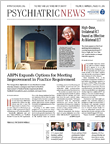Patients with bipolar disorder struggle with depressive more often than mood elevation episodes. Although, on average, depressive episodes considered across all patients with bipolar disorder may differ from those considered across all patients with unipolar major depressive disorder, individual variation makes diagnosis of bipolar disorder during a depressive episode in individual patients challenging.
In the past, classical bipolar depression was considered to be characterized by symptoms opposite to those seen in mania, and thus entail low mood, decreased energy, and slowed thought. Thus “reversed vegetative symptoms” of hypersomnia, hyperphagia, and anergy/psychomotor retardation were considered characteristic of bipolar depression. However, in the last several years there has been increased appreciation that some depressions (referred to as mixed depressions, or in DSM-5 as major depressive episodes with mixed features) involve not only depressive symptoms but also mood elevation symptoms such as euphoria, decreased need for sleep, racing thoughts, inflated self-esteem, overtalkativeness, increased goal-directed activity, and impulsivity. Importantly, DSM-5 considers psychomotor agitation, irritability, and distractibility (which can occur not only in hypo/mania, but also in depression) to lack polarity specificity and thus does not permit these “overlapping” symptoms to count toward mixed depression.
It is posited by at least some experts that mixed depression, like bipolar depression, may be associated with treatment-emergent affective switch or repeated instances of antidepressant inefficacy, consistent with the notion that mixed depression could represent a form of depression on the bipolar-unipolar spectrum. One consequence of adopting such an approach would be for the spectrum of bipolar depression to become remarkably broad, including not only hyperphagic, hypersomnia, anergic depressions but also mixed depressions, leaving relatively few depressive symptom clusters to be considered characteristic of unipolar major depression. Perhaps to mitigate such an expansion of bipolar disorder diagnosis, DSM-5 has permitted mixed depressions to occur not only in patients with bipolar disorder, but also in patients with unipolar major depressive disorder. Unfortunately, this could serve to cloud the distinction between bipolar and unipolar disorders.
Like DSM-IV, DSM-5 bipolar diagnosis relies upon detection of at least one prior hypo/manic episode to distinguish bipolar disorder from unipolar major depressive disorder. Unfortunately, in currently depressed patients detection of prior manic and even more so hypomanic episodes is relatively insensitive and unreliable, raising the risks of inaccurate (that is, unipolar major depressive disorder rather than bipolar disorder) diagnosis and inappropriate treatment (for example, antidepressant monotherapy rather than agents approved for bipolar depression) of depressed patients with bipolar disorder.
Although DSM-5 has permitted mood elevation that persists beyond the expected physiological action of an implicated triggering antidepressant to count toward a bipolar disorder diagnosis, it has not factored in other illness characteristics such as (1) hyperphagic, hypersomnic, anergic depressive symptoms, (2) mood disorder onset before age 25 years, (3) family history of bipolar disorder, (4) history of psychosis, and (5) problematic outcomes with antidepressants (for example, multiple instances of nonresponse or worsening depression) in determining the likelihood of a depressive presentation ultimately having a bipolar outcome. Arguably, the use of such information in a probabilistic approach to the likelihood of a mood disorder ultimately being bipolar could permit more accurate and timely diagnosis and more effective treatment for depressed patients in whom there is a substantive risk of a bipolar outcome.
An issue of considerable interest is how many bipolar outcome risk factors need to be present to raise a substantive risk of a bipolar outcome in a depressed patient. The presence of a single bipolar outcome risk factor may not markedly increase the risk of a depressed patient ultimately having bipolar disorder. In contrast, the presence of more than one bipolar outcome risk factor may merit additional caution as such depressed patients may have substantive risks of bipolar outcomes.
It is hoped that future research will help clinicians rise to the important clinical challenge of diagnosing possible bipolar disorder in depressed patients in a timely and accurate fashion. ■

